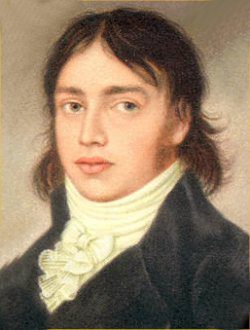Samuel Taylor Coleridge was born on this day, October 21st, in 1772.
He was a member of the Lake Poets, and considered a co-founder with William Wordsworth of the English Romantic Movement. Coleridge is often credited for introducing German Idealism to the English speaking world. Obviously an overstatement. But he is very important.
The child of an Anglican vicar and school master, he was a bookish child. He suffered from rheumatic fever and was sickly throughout his life. Contemporary scholars are inclined to think he suffered from bipolar disorder. There are a number of moments in his life that would be explained with the diagnosis.
He began reading at six, and very early on was captured by the Arabian Nights. I looked this up and see that this would have been well before Burton’s unexpurgated complete version. Still, it was sufficient fantastic to capture his imagination.
He attended Cambridge, but in the middle of his studies enlisted in the army under the alias Silas Tomkyn Comberbache. His brothers were able to get him out within a few months. With the exchange of some money, he was discharged for insanity. He returned to school, but left without a degree. He married, apparently unhappily, and the couple separated after the birth of their fourth child.
Coleridge issued his first volume of poetry in 1796.
He needed work and briefly considered the ministry. He moved in Unitarian circles and Reverend Joseph Priestley was one of his mentors. He wrote of his own preaching at the time he was exploring whether to ordain, “my sermons spread a sort of sanctity over my sedition.” On the eve of his deciding, Josiah Wedgwood offered him an annuity equal to what his salary would have been as a minister. The Wikipedia article asserts with the condition he not ordain. Another biographical sketch I’ve found asserts the offer came with no conditions. Whatever, with cash in hand he did not ordain. Within months he published The Ancient Mariner, which made his reputation.
By 1814 he repudiated his Unitarianism for orthodoxy of the Anglican sort. Nonetheless he directly influenced Ralph Waldo Emerson and other Transcendentalists. And so has a bit of a place in the Unitarian Universalist pantheon. Towards the later part of his life he and Joseph Blanco White were central in the rise of “the ‘Broad Church’ movement in the Church of England, which was a liberal force in the middle of the century, with another ex-Unitarian, Frederick Denison Maurice, as one of its leading figures.”
An interesting and complex figure. I love that he is credited with coining the phrase “suspension of disbelief.”
His poetry is less read today, but pretty much everyone still recognizes lines from Kubla Khan and the Rime of the Ancient Mariner.
Still, maybe today, in honor of the old boy’s two hundred, forty-ninth birthday, worth a revisit…













